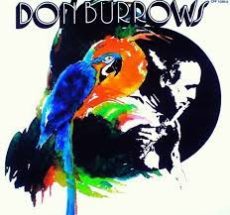
Daily Dose Of Jazz…
Donald Vernon Burrows was born on August 8, 1928 Marrickville, New South Wales, Australia and attended Bondi Public School. In 1937, visiting flutist and teacher Victor McMahon inspired him to start learning the flute, beginning on a B-flat flute. By 1940 he was captain of the Metropolitan Schools Flute Band and studying at the Sydney Conservatorium of Music.[2]
In 1942, Burrows had begun playing clarinet and appeared on The Youth Show, a Macquarie Radio show. In 1944 he was invited to play and record with George Trevare’s Australians. He became well-known in Sydney jazz circles and was performing in dance halls, nightclubs and radio bands.
During the 1960s and 1970s, Burrows had many engagements in Australia and the United States, including six years performing at the Wentworth Hotel in Sydney. In 1972, he was invited to perform at the Montreux Jazz Festival[4] and later the Newport Jazz Festival.
He received his first gold record in 1973 for his record Just the Beginning, instigating the first jazz studies program in the southern hemisphere, at the New South Wales Conservatorium of Music. He was appointed a Member of the Order of the British Empire (MBE) and appointed Chair of Jazz Studies at the conservatorium.
Though he mostly performed to classical music audiences through tours with Musica Viva and the Australian Broadcasting Corporation concert series, he had an extensive recording career with his groups and performed on albums by others. He also worked with Frank Sinatra, Dizzy Gillespie, Nat King Cole, Oscar Peterson, Tony Bennett, Stéphane Grappelli, Cleo Laine, and the Sydney Symphony Orchestra.
His arthritis from age 38, though making it somewhat difficult to play, never stopped him. In later years he had Alzheimer’s disease and lived in a nursing home in northern Sydney. Saxophonist, flutist and clarinetist Don Burrows transitioned on 12 March 12, 2020, aged 91.
More Posts: bandleader,clarinet,flute,history,instrumental,jazz,music,saxophone
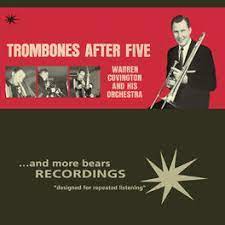
Daily Dose Of Jazz…
Warren Covington was born on August 7, 1921 in Philadelphia, Pennsylvania and played with Isham Jones in 1939, then with Les Brown in 1945-46 and Gene Krupa in late 1946. Following this he became a staff musician for CBS radio.
By the end of the decade he was working with Ralph Flanagan and again in the mid Fifties. He played briefly with Tommy Dorsey but by 1956 he replaced Eddie Grady as leader of the Commanders, a Decca recording and touring band which lasted until the middle of 1957. Covington recorded two albums and one single with this band.
Post Tommy Dorsey’s sudden death in 1956, the band continued under the direction of Jimmy Dorsey. However, Tommy’s estate took back his arrangements and approached Warren to form a new Tommy Dorsey band, which he led, touring and recording for Decca, into 1961. Among his hits with the Dorsey band was Tea for Two Cha Cha, which sold over one million copies and was awarded a gold disc.
A player who also occasionally played, with a variety of the baritone horn, baritone and tenor saxophone, Covington participated in the big bands of Charles Mingus, Randy Weston, Bobby Hackett, and George Benson on recordings, and also a number of film soundtracks.
Big band trombonist Warren Covington, who was also an active session player, arranger and bandleder, transitioned on August 24, 1999 in New York.
More Posts: arranger,bandleader,history,instrumental,jazz,music,trombone
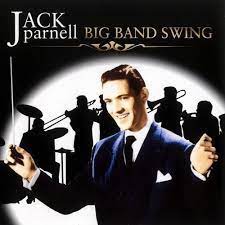
Daily Dose Of Jazz…
John Russell Parnell was born on August 6, 1923 in Paddington, London, England and raised in Wembley. The only son of vaudevillians, his father a ventriloquist, his mother, a gifted classical pianist, worked as her husband’s accompanist. He toured with his parents as a very young child and standing in the wings enthralled by the big bands that were often top of the bill in the late 1920s. He started piano lessons as a four-year-old and could pick up tunes easily. Sent away to boarding school from the age of six, he began to take an interest in drums, and this soon became a consuming passion.
Not much interested in academic study, Parnell bought all the jazz records he could, starting with Duke Ellington and moving on to the more informal Chicago school epitomised by trumpeter Muggsy Spanier. Armed with a Premier drum kit purchased by his mother from the window-cleaner for £15 and following six lessons from Max Abrams, at 15 he ventured north to Scarborough to start his professional career playing for the summer season at the town’s theatre.
During his military service in the 1940s he became a member of Buddy Featherstonhaugh’s Radio Rhythm Club Sextet and played drums with Vic Lewis and other servicemen who were keen on jazz. From 1944 to 1946 he recorded with the Lewis-Parnell Jazzmen’s version of Ugly Child.
During the 1940s and 1950s, Parnell was voted best drummer in the Melody Maker poll for seven years in succession. He composed many television themes, including Love Story, Father Brown, The Golden Shot and Family Fortunes. He was a regular judge on the ATV talent show New Faces and the musical director for The Benny Hill Show.
He was appointed as the musical director for ATV in 1956, a post he held until 1981, and was the conductor for The Muppet Show orchestra for the series’ entire run. Jack composed the score theme for ITC Entertainment. Throughout the 1960s, Parnell directed the pit orchestra for Sunday Night at the London Palladium.
In the 1970s, he co-founded the group The Best of British Jazz with Kenny Baker, Don Lusher, Betty Smith, Tony Lee, and Tony Archer, which performed until 1985. From 1991 on Parnell was part of the Norfolk-based Mike Capocci Trio who backed saxophonists Johnny Griffin, Ronnie Ross, and Kathy Stobart. In 1994, he took over as the leader of the London Big Band.
Drummer and musical director Jack Parnell, whose uncle was the theatrical impresario Val Parnell, transitioned from the effects of cancer at 87 on August 8, 2010 in Southwold, Suffolk, England.
More Posts: bandleader,conductor,drums,history,instrumental,jazz,music,music director
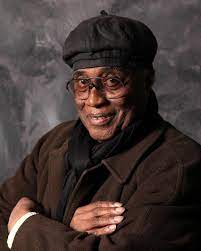
Three Wishes
Pannonica asked Richard Davis what his three wishes would be if they could be granted and he replied with:
- “Freedom for everybody.”
- “Mastery of the bass.”
- “It’s my hobby really to own a horse. These are the three basic things in my life.”
*Excerpt from Three Wishes: An Intimate Look at Jazz Greats ~ Compiled and Photographed by Pannonica de Koenigswarter
More Posts: baroness,bass,history,instrumental,jazz,music,pannonica,three,wishes
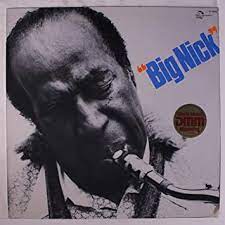
Daily Dose Of Jazz…
George Walker “Big Nick” Nicholas was born August 2, 1922 in Lansing, Michigan. Picking up the tenor saxophone during his teen years, he was strongly influenced by his hero, Coleman Hawkins. He started playing professionally during the 1940s with Hank and Thad Jones, Earl Hines, and Tiny Bradshaw prior to military service.
Once discharged from the Army late in the decade he went on to work with bands led by Sabby Lewis, J. C. Heard, and Lucky Millinder. He would go on to play with Duke Ellington, Cab Calloway, Charlie Parker, and Charlie Mingus.
Nicholas contributed the 16-bar solo to Dizzy Gillespie’s classic 1947 African-Cuban jazz composition Manteca. At that time, he also started playing with Hot Lips Page, a working relationship that continued until 1954. He then joined Buck Clayton in 1955.
Big Nick influenced a young John Coltrane to compose his tribute Big Nick, included on the 1962 album Duke Ellington & John Coltrane.
Saxophonist and singer Big Nick Nicholas transitioned from heart failure in Queens, New York on October 29, 1997 at the age of 75.
More Posts: bandleader,history,instrumental,jazz,music,saxophone


